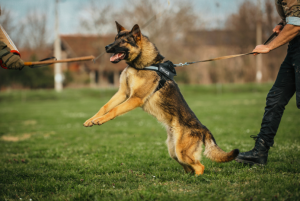If you have a dog that shows signs of aggression—whether it’s barking, lunging, or snapping—you know how stressful it can be. Walking your dog around the block or visiting a dog park turns into a nerve-wracking experience. Naturally, you want to help your furry friend behave better and feel more at ease, but the big question is: What’s the best way to train an aggressive dog?
While many dog owners consider group obedience classes, the truth is, private dog training sessions are the safest and most effective route for aggressive dogs. Here’s why.
Safety First—for Everyone
Aggressive dogs aren’t “bad” dogs; often, they’re scared, frustrated, or confused. But no matter the reason, safety has to come first. In group classes, there are multiple dogs and owners gathered in one space. If your dog feels threatened or overwhelmed, things can escalate quickly—putting other dogs, people, and even your own pet at risk.
In private sessions, it’s just your dog, you, and the trainer. This controlled environment removes the pressure and risk, allowing real progress to happen without worrying about accidents.
Distractions Can Be a Disaster
Let’s be honest—group classes can be chaotic. Dogs of all sizes and temperaments, lots of noise, and an unfamiliar setting can spell disaster for a dog prone to aggression. Instead of learning, your dog may spend the entire time on high alert, stressed out, and ready to react.
Private training avoids this mess. Your trainer can work with your dog in a calm, focused setting—whether it’s at home or in a quiet outdoor space—helping your dog stay relaxed and actually absorb the training.
Tailored Training for Complex Issues
Aggression isn’t a one-size-fits-all problem. One dog might be territorial, while another is fearful, and yet another has leash aggression. Group classes follow a standard curriculum that covers basic obedience, but they aren’t designed to tackle deep-rooted behavioral issues.
With private sessions, the trainer can dig into your dog’s unique triggers and create a personalized behavior plan. Whether it’s desensitization to strangers, helping with resource guarding, or teaching your dog how to stay calm around other animals, private training targets what your dog actually needs.
More Progress, Less Stress
In group classes, the trainer’s attention is divided among several dogs and owners. If your dog is struggling or acting out, there’s often not enough time to pause and address the problem in depth.
Private aggressive dog training? It’s 100% about you and your dog. The trainer can move at your dog’s pace, troubleshoot in real time, and tweak techniques on the spot. That means faster progress and less stress for both you and your pup.
Building Trust and Confidence
Aggressive dogs often lack confidence or have had bad experiences in the past. Throwing them into a group class where they feel cornered or vulnerable can actually make things worse. Private sessions allow the trainer to build a bond of trust with your dog—essential for making real headway.
Step by step, your trainer will help your dog learn that new situations, people, and even other dogs aren’t as scary as they seem. Over time, this builds your dog’s confidence—and yours, too.
Customized Pace of Exposure
One key factor in rehabilitating an aggressive dog is controlling how and when they’re exposed to their triggers. In group classes, exposure happens immediately and often without a gradual build-up, which can overwhelm a reactive dog. In private training, your trainer can carefully manage exposure, starting with small, manageable steps and only increasing challenges when your dog is ready. This approach minimizes setbacks and ensures progress is made safely.
Continuity and Consistency
Aggressive dogs thrive on routine and consistency. Group classes can vary each week—different dogs attending, new locations, or different substitute trainers. These inconsistencies can confuse and stress an aggressive dog. With private training, your dog works with the same trainer in a consistent setting, building a reliable routine that promotes steady, lasting improvements.
Is Private Training Worth It?
Yes, private sessions cost more than group classes—but when it comes to aggressive dogs, think of it as an investment in safety, peace of mind, and your dog’s well-being. Addressing aggression the right way reduces risks and helps your dog become a calmer, more manageable companion.
In Summary
Group classes are fantastic for teaching basic skills and socialization—but not for aggressive dogs. For these dogs, private training offers:
- A safe, controlled space
- Personalized, targeted behavior plans
- The trainer’s full attention
- A stress-free environment for learning
If your dog struggles with aggression, the best gift you can give them is patient, professional help in a setting that sets them up for success. Private training is the safest path forward—for your dog, for you, and for everyone around you.



